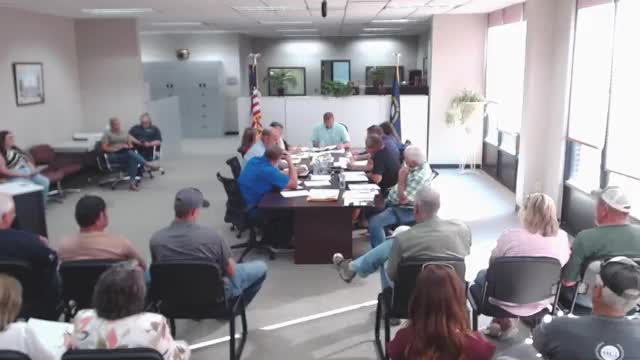County debates solar resolution amid community concerns
August 05, 2024 | Ballard County, Kentucky
This article was created by AI summarizing key points discussed. AI makes mistakes, so for full details and context, please refer to the video of the full meeting. Please report any errors so we can fix them. Report an error »

In a recent government meeting, officials discussed several key financial and procedural matters, including employee benefits, cash transfers, and a contentious solar energy resolution that has sparked community concern.
The meeting began with a motion to approve installment payments for employee insurance, which was unanimously passed. Following this, officials moved to approve cash transfers, also receiving unanimous support. Additionally, a proposal was introduced to allow employees to set up savings or checking accounts with a local bank, enabling direct deductions from their paychecks. This initiative aims to assist employees who previously utilized Health Savings Accounts (HSAs) but can no longer do so due to changes in their insurance plans.
A significant portion of the meeting was dedicated to discussing a solar energy resolution that has drawn criticism from local residents. Jill Rye, representing a group of petitioners, urged the court to reconsider a resolution passed in April that reduced the setback requirements for solar installations by 90%. Rye argued that the process lacked proper procedural due diligence, including failure to notify affected residents adequately. She called for reinstating the original setback requirements or holding a public hearing to address community concerns.
Residents expressed worries about potential declines in property values due to nearby solar developments, with estimates suggesting a decrease of 1.5% to 5%. Some speakers proposed a compromise, suggesting a 1,000-foot setback from property boundaries to mitigate impacts on neighboring homes.
The court acknowledged the concerns raised and indicated that legal counsel is reviewing the resolution to determine possible amendments. Officials emphasized their commitment to transparency, noting that all meetings are streamed online and minutes are publicly accessible.
As discussions continue, the community remains engaged, advocating for their interests while local officials navigate the complexities of energy development and its implications for residents.
The meeting began with a motion to approve installment payments for employee insurance, which was unanimously passed. Following this, officials moved to approve cash transfers, also receiving unanimous support. Additionally, a proposal was introduced to allow employees to set up savings or checking accounts with a local bank, enabling direct deductions from their paychecks. This initiative aims to assist employees who previously utilized Health Savings Accounts (HSAs) but can no longer do so due to changes in their insurance plans.
A significant portion of the meeting was dedicated to discussing a solar energy resolution that has drawn criticism from local residents. Jill Rye, representing a group of petitioners, urged the court to reconsider a resolution passed in April that reduced the setback requirements for solar installations by 90%. Rye argued that the process lacked proper procedural due diligence, including failure to notify affected residents adequately. She called for reinstating the original setback requirements or holding a public hearing to address community concerns.
Residents expressed worries about potential declines in property values due to nearby solar developments, with estimates suggesting a decrease of 1.5% to 5%. Some speakers proposed a compromise, suggesting a 1,000-foot setback from property boundaries to mitigate impacts on neighboring homes.
The court acknowledged the concerns raised and indicated that legal counsel is reviewing the resolution to determine possible amendments. Officials emphasized their commitment to transparency, noting that all meetings are streamed online and minutes are publicly accessible.
As discussions continue, the community remains engaged, advocating for their interests while local officials navigate the complexities of energy development and its implications for residents.
View the Full Meeting & All Its Details
This article offers just a summary. Unlock complete video, transcripts, and insights as a Founder Member.
✓
Watch full, unedited meeting videos
✓
Search every word spoken in unlimited transcripts
✓
AI summaries & real-time alerts (all government levels)
✓
Permanent access to expanding government content
30-day money-back guarantee

